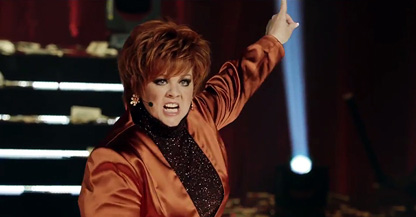Movie Review: The Boss
By Ben Gruchow
April 14, 2016
BoxOfficeProphets.com

She's a red-light-on performer, a natural, and she does such superhuman work to save The Boss from itself that I almost feel compelled to give the film a pass. She plays a role that would be, I think, unworkable in the custody of just about anyone else. Michelle Darnell, the titular Boss, CEO of multiple corporations until she's arrested for a bout of insider trading and consigned to the living room couch of her former assistant Claire (Kristen Bell), is a terrible protagonist; take McCarthy out of the role and you have a story about an emotionally stunted, repugnant misanthrope who goes from taking advantage of people while wealthy to taking advantage of people while destitute, with a subplot about Darnell's family issues shoehorned into the third act.
Adding onto this unwieldy alchemy of unplayable role and unyielding charisma is a plot universe of the lower order: Claire has a young daughter, who factors into every decision she ever makes and thus mechanically provides her with something resembling character motivation. Then there is the plot to get Darnell back onto her feet by competing with the local Girl Scout-esque troop for business, and the adversarial leader of the troop, and then on top of it all there's Darnell's business rival and one-time lover Renault (Peter Dinklage); for reasons that will eventually become clear, he has an interest in making sure that Darnell doesn't re-ascend to her position of power.
There's a lot of plot there, even though none of it is original or very meaningful, and it requires a deft directorial hand merely to keep these plates spinning in a way that renders the plot machinery invisible (or tolerable). Ben Falcone, whose last effort was Tammy, is not such an individual, and so The Boss proceeds forward in a series of fits and starts, dawdling for far too long on useless by-plots like the Scout troop meetings (they're called Dandelions here, as if it matters) before accelerating through the entire competition plot and plan for Darnell's resurgence, compressing it into about five minutes of arrhythmic story developments. And we haven't yet arrived at the point where the movie tries to reach for our heartstrings, where the cause of Darnell's antagonistic and misanthropic behavior is revealed, if not adequately justified.
With The Boss, Falcone and McCarthy (who shared writing duties with Steve Mallory) are clearly aiming for a style of comedy that's laced with observations on character deficiency and stunted emotional growth. No complaint from me there; great comedy comes from pain, and McCarthy has the range to land them both (not for nothing was her dinner-table monologue in Identity Thief one of her best moments in the sum total of her work as an actress, even though it couldn't come close to rescuing the movie around it). What handicaps their work here, as it did last time, is a total inconsistency of tone and timing.
The Boss is a “funnier” movie than Tammy, in the sense that more of its intended jokes result in a laugh, but they're often not the kind of laugh that you feel particularly good about having afterward. When a moment truly does land, as during Darnell's deliriously scathing put-down of where the Dandelions' funding goes, it's usually because of McCarthy's unwavering commitment to the moment at hand. For every one of these, though, there are two moments (like a series of quiet but heated exchanges between Darnell and Dandelion mother Helen (Annie Mumolo) where we may crack a smile at the snark on display while being aware of how lazy the movie is being in getting our reaction.
And then there are the heaps of content that just plain don't work at all, like an endless back-and-forth between McCarthy and Bell over date attire and breast size and shape, or the miscasting of the bland and one-note Cecily Strong as a Darnell-worshipping power executive. Or a painfully unfunny extended joke about fellatio as a distraction. Or a pull-out couch with violent tendencies. Or Renault.
Dear me, Renault. This is a fatally misconceived, overdeveloped antagonist. As played by Dinklage, he's not funny, or frightening, or sharp. He does not in the least fit within the gossamer strands of fabric the movie's universe has thus been able to conjure for itself. The origin of his adversarial relationship with Darnell is arbitrary and tiresome. Whenever he appeared on-screen, the movie grinds loudly to an embarrassing halt. I wanted to shrink into my seat, or disappear into my phone…anything to avoid experiencing the reality of the moment. I felt bad for Dinklage. This is the type of role the actor discusses in termination clauses with his or her agent; if they don't, they ought to.
I think there is a good film waiting for Falcone somewhere down the line; he is demonstrating a desire to meld comedy with drama in a way that makes me understand why McCarthy would be drawn to the concept alongside a bevy of respectable talent. He needs to develop as a director; the movie's few kinetic and capering moments suffer from a clunkiness of camera placement and movement, and a slackness of editing. And he needs to show the same boldness with his story elements as he does with his concepts; these have thus far retreated to the most straightlaced and predictable of possible outcomes. The Boss is the better of the two films on their shared résumé, while still being distinctly bad on its own merits. I prefer to be the optimist, and hope for better down the line.